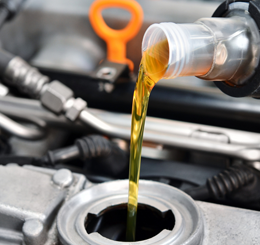Genuine oil (OEM-branded engine oil) demand growth in Asia-Pacific will be driven by growth in the overall passenger car motor oil (PCMO) demand, which in turn is driven by an increase in automotive production and car population. Japan, a mature market of the region, Japan, shows slower vehicle growth with an average service life of passenger cars around 12 to 13 years. Toyota and Honda together account for 50% of passenger vehicle sales in Japan.
The factory-fill volume accounts for less than 5% of the total PCMO consumption in Japan while the service-fill volume, which includes genuine oil, co-branded, and merchant brands, accounts for the balance.
The Japanese genuine oil market has been well established by Japanese OEMs with the stable share of genuine oils in total PCMO demand in Japan, always between 70% to 75%.
Due to Japanese culture, most vehicle owners go to authorized workshops to have their oil changed and mainly consume genuine oil; as a result, the share split of genuine oil brands is highly corelated with the share split of OEMs in the passenger vehicle population.
The largest volume of PCMO genuine oil consumed by OEM brand is Toyota, followed by Honda.
In contrast to other countries, genuine oil in Japan is not only sold by OEMs dealers, but also by independent workshops (IWS). There are two major kinds of IWS in Japan:
− IWS chains set up by companies who sell spare parts
− Standalone workshops
As OEMs control dealers very strictly and directly provide incentives through maintenance packages to vehicle owners, there aren’t any sales targets or incentive programs on genuine oil for dealers.
The OEMs in Japan have a different supply chain for their genuine oil distribution through dealers. For instance, Honda dealers place their orders with Honda, but the product is directly supplied by blenders to dealers.
Toyota dealers do not purchase genuine oil from Toyota. Its dealers in a given area jointly own a Toyota Car Parts Company. For example, in Tokyo, there is Tokyo Toyota Car Parts Company and in Hokkaido, there is Hokkaido Toyota Car Parts Company. These companies receive orders from dealers that are then transferred to blenders. The blenders supply genuine oil to the ordering vehicle parts company, which then distributes to the dealerships.
The distribution to IWS is also through different supply chains for genuine oil.
As the overall volume of PCMO and therefore genuine oil demand will decline in Japan over the next five years, OEMs will be enhancing their incentives strategies to customers to grow their share of genuine oil in PCMO demand. This could be in the form of enhanced warranties, better maintenance packages, or membership strategies. Some OEMs may start to heavily invest into advertising and marketing to support this business.
To find more about Genuine oil (OEM-branded engine oil) ask about our OEM Genuine Oil Brands and Programs in the Consumer Automotive Segment: Market Analysis and Opportunities

